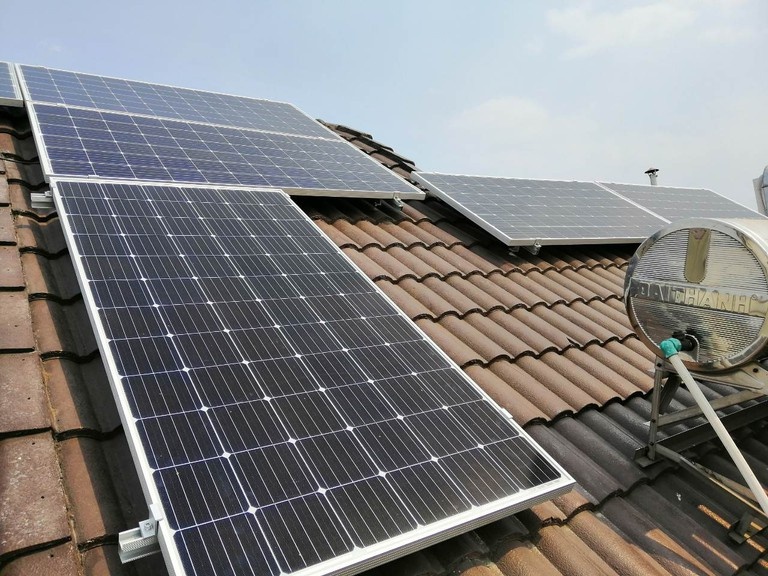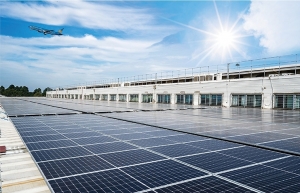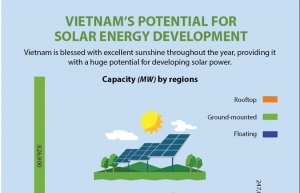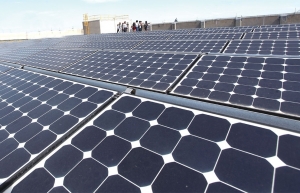Rooftop solar energy lacks legal foundation
The Electricity and Renewable Energy Authority under the Ministry of Industry and Trade, has recently submitted a written response to Bacai Packaging Manufacturer JSC on manufacturing investments in rooftop solar energy panels with a capacity of less than 1MW.
In response to this statement from the authorities, renewable energy specialist Nguyen Binh said that self-use rooftop solar electricity in major manufacturing plants cannot be connected to the domestic electricity system. Business operations need constant output and voltage to assure continuous operation, however, this power supply is intermittent. As a result, connecting to the national electrical grid is critical in order to balance the demand for electricity.
 |
| Self-use rooftop solar energy panels |
Therefore, businesses are required to collaborate with Electricity of Vietnam (EVN) or units recognised by EVN in full compliance with the legislation. In addition, rooftop solar power investment and development must comply with all applicable laws and legislation on energy, investments, buildings, the environment, and fire prevention and suppression.
EVN also stated that since rooftop solar energy systems are mounted only within the investor's management scope and not under the supervision of the power plants, the refusal to enable investors to develop renewable electricity sources for self-use could cause adverse responses from investors and local communities.
Even if EVN approved, there is no clear legal foundation specifying the circumstances, order, and processes for connection, installation criteria, and technical specifications for the self-use of rooftop solar power systems.
In a report to Prime Minister Pham Minh Chinh, chairman of EVN's Member Council Duong Quang Thanh stated, "The lack of control over rooftop solar power systems for self-use can make it extremely difficult to plan to mobilise other existing power sources to guarantee a balance between supply and demand."
The present demand for rooftop solar power systems for on-site self-use is not insignificant. EVN and other power units have received several requests to connect rooftop solar power systems solely for on-site usage – as opposed to selling energy to the grid.
For instance, Norsk Solar (Vietnam) Co., Ltd. – a company backed by investors and the Government Development Fund of Norway and Finland – intends to invest in rooftop solar electricity systems for industrial parks, industrial plants, and trade centres. Maruha Chemical Vietnam Co., Ltd., a subsidiary of Toray Industries Inc., wants to invest in rooftop solar power at the firm's factory system for internal use and the Tien Giang Department of Industry and Trade plans to deploy rooftop solar power at its head office.
EVN believes that a method is needed to bind energy consumers' obligations at their own risk when a customer's rooftop solar power system fails and the power grid is unable to meet the demand for electricity.
Binh said that despite the fact that enterprises have invested in rooftop solar electricity for self-use, the power sector must still invest in infrastructure to support them. However, it is uncertain when this infrastructure will be deployed.
This also causes an increase in the system's power generation costs, resulting in overall waste. Therefore, explicit restrictions are required in the form of national technical guidelines for rooftop solar power and a system for verifying conformity with technical requirements for rooftop solar power equipment (photovoltaic panels, inverters, and storage) prior to market entry.
Technical requirements for the connection of monitoring and control equipment to rooftop solar power systems and the investor's binding obligation for procedural cooperation are also suggested to ensure the security of the national power grid.
"Only when there are direct guidelines from state management agencies can investors spend money on self-use rooftop solar power to achieve their goal of employing a large amount of renewable technology," Binh said.
As it is unknown when the authorities will have completed clear processes, it is evident that the proposals of the aforementioned enterprises have reached a dead end in the short term.
 | Renewable efficiency for Vietnamese cities Energy developer Copper Mountain Energy JSC (CME) is carrying out the first renewables venture at a Vietnamese airport. CEO Bui Trung Kien talked with VIR’s Nhat Ha why the initiative is important, and how the company’s moves will ultimately benefit both customers and the environment. |
 | Vietnam’s potential for solar energy development Vietnam is blessed with excellent sunshine throughout the year, providing it with a huge potential for developing solar power. |
 | Overseas investors boosting rooftop solar presence at IZs Many foreign investors are funding rooftop solar panels in Vietnam to meet the increasing demands of industrial zone developers and transition towards sustainable energy sources. |
What the stars mean:
★ Poor ★ ★ Promising ★★★ Good ★★★★ Very good ★★★★★ Exceptional
Related Contents
Latest News
More News
- Trung Nam-Sideros River consortium wins bid for LNG venture (January 30, 2026 | 11:16)
- Vietnam moves towards market-based fuel management with E10 rollout (January 30, 2026 | 11:10)
- Envision Energy, REE Group partner on 128MW wind projects (January 30, 2026 | 10:58)
- Vingroup consults on carbon credits for electric vehicle charging network (January 28, 2026 | 11:04)
- Bac Ai Pumped Storage Hydropower Plant to enter peak construction phase (January 27, 2026 | 08:00)
- ASEAN could scale up sustainable aviation fuel by 2050 (January 24, 2026 | 10:19)
- 64,000 hectares of sea allocated for offshore wind surveys (January 22, 2026 | 20:23)
- EVN secures financing for Quang Trach II LNG power plant (January 17, 2026 | 15:55)
- PC1 teams up with DENZAI on regional wind projects (January 16, 2026 | 21:18)
- Innovation and ESG practices drive green transition in the digital era (January 16, 2026 | 16:51)

 Tag:
Tag:




















 Mobile Version
Mobile Version